
MMMU
This repo contains evaluation code for the paper "MMMU: A Massive Multi-discipline Multimodal Understanding and Reasoning Benchmark for Expert AGI"
Stars: 374
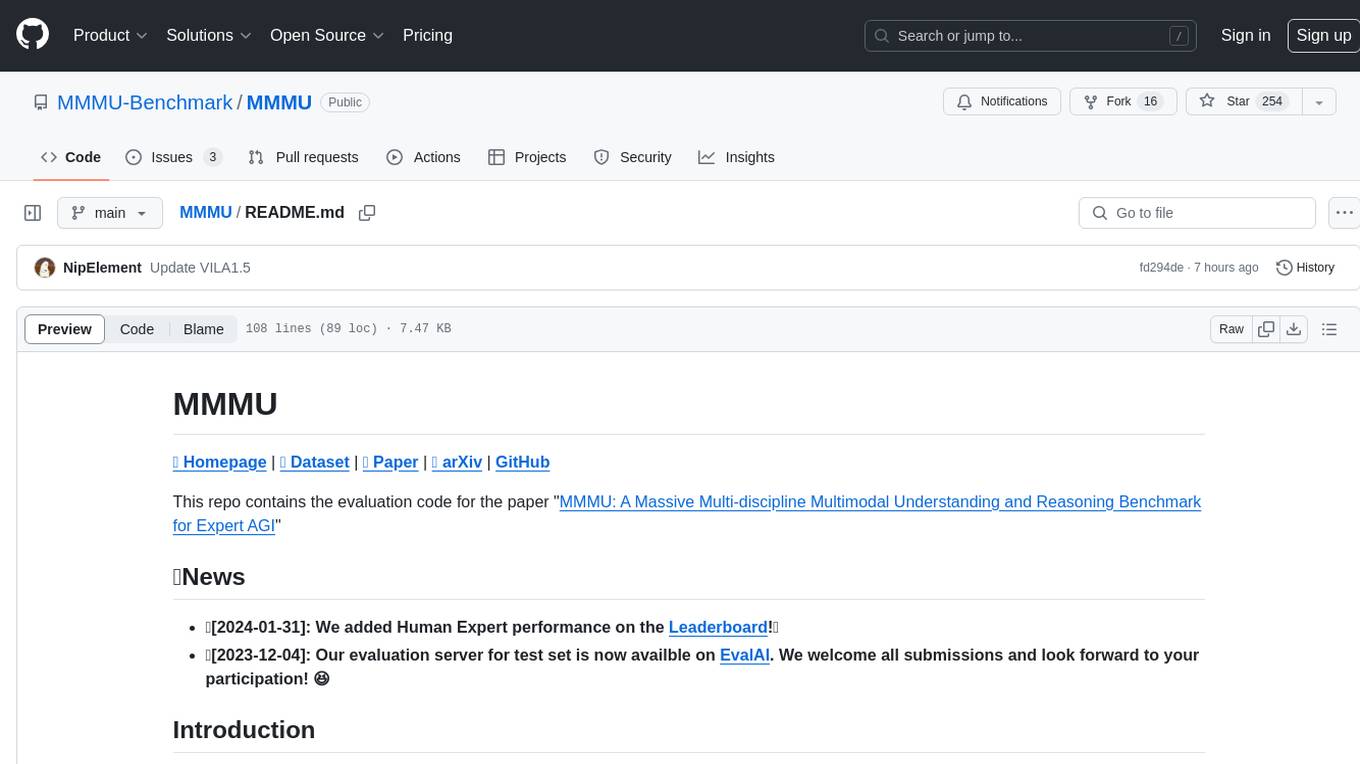
MMMU is a benchmark designed to evaluate multimodal models on college-level subject knowledge tasks, covering 30 subjects and 183 subfields with 11.5K questions. It focuses on advanced perception and reasoning with domain-specific knowledge, challenging models to perform tasks akin to those faced by experts. The evaluation of various models highlights substantial challenges, with room for improvement to stimulate the community towards expert artificial general intelligence (AGI).
README:
🌐 Homepage | 🏆 Leaderboard | 🤗 MMMU-Pro | 📖 MMMU-Pro arXiv | 🤗 MMMU | 📖 MMMU arXiv
This repo contains the evaluation code for the paper "MMMU-Pro: A More Robust Multi-discipline Multimodal Understanding Benchmark" and "MMMU: A Massive Multi-discipline Multimodal Understanding and Reasoning Benchmark for Expert AGI"
- 🔥[2024-09-05] Introducing MMMU-Pro, a robust version of MMMU benchmark for multimodal AI evaluation! 🚀
- 🚀[2024-01-31]: We added Human Expert performance on the Leaderboard!🌟
- 🔥[2023-12-04]: Our evaluation server for test set is now availble on EvalAI. We welcome all submissions and look forward to your participation! 😆
MMMU is a new benchmark designed to evaluate multimodal models on massive multi-discipline tasks demanding college-level subject knowledge and deliberate reasoning. MMMU includes 11.5K meticulously collected multimodal questions from college exams, quizzes, and textbooks, covering six core disciplines: Art & Design, Business, Science, Health & Medicine, Humanities & Social Science, and Tech & Engineering. These questions span 30 subjects and 183 subfields, comprising 32 highly heterogeneous image types, such as charts, diagrams, maps, tables, music sheets, and chemical structures. Unlike existing benchmarks, MMMU focuses on advanced perception and reasoning with domain-specific knowledge, challenging models to perform tasks akin to those faced by experts. Our evaluation of 14 open-source LMMs and the proprietary GPT-4V(ision) highlights the substantial challenges posed by MMMU. Even the advanced GPT-4V only achieves a 56% accuracy, indicating significant room for improvement. We believe MMMU will stimulate the community to build next-generation multimodal foundation models towards expert artificial general intelligence (AGI).
Building upon MMMU, MMMU-Pro introduces even more stringent assessment methodologies to evaluate multimodal models' intrinsic understanding and reasoning capabilities. MMMU-Pro employs a meticulously structured three-step process:
- Filtering out text-only answerable questions: Ensures that the questions pressing multimodal understanding rather than purely textual comprehension.
- Augmenting candidate options: Introduces additional plausible options to make the task more challenging.
- Vision-only input setting: Embedding questions within images pushes AI to "see" and "read" simultaneously, replicating a core human cognitive skill of integrating visual and textual information.
Our results reveal that model performance on MMMU-Pro is significantly lower than on MMMU, with accuracies ranging from 16.8% to 26.9% across various models. We investigate the effects of OCR prompts and Chain of Thought (CoT) reasoning. OCR prompts have minimal impact, while CoT generally enhances performance. MMMU-Pro offers a more rigorous evaluation framework, closely reflecting real-world scenarios and providing critical insights for advancing multimodal AI research.
MMMU and MMMU-Pro were meticulously designed to challenge and evaluate multimodal models with tasks demanding college-level subject knowledge and complex reasoning. For more detailed information, please refer to our Hugging Face datasets:
Please refer to our evaluation folders for detailed information on evaluating with both MMMU and MMMU-Pro benchmarks:
🎯 MMMU Evaluation
- We have released a full suite comprising 150 development samples and 900 validation samples. However, the 10,500 test questions are available without their answers.
- Use the development set for few-shot/in-context learning.
- Use the validation set for debugging models, selecting hyperparameters, and quick evaluations.
The answers and explanations for the test set questions are withheld. You can submit your model's predictions for the test set on EvalAI.
The guidelines for the annotators emphasized strict compliance with copyright and licensing rules from the initial data source, specifically avoiding materials from websites that forbid copying and redistribution. Should you encounter any data samples potentially breaching the copyright or licensing regulations of any site, we encourage you to contact us. Upon verification, such samples will be promptly removed.
- Xiang Yue: [email protected]
- Yu Su: [email protected]
- Wenhu Chen: [email protected]
BibTeX:
@inproceedings{yue2023mmmu,
title={MMMU: A Massive Multi-discipline Multimodal Understanding and Reasoning Benchmark for Expert AGI},
author={Xiang Yue and Yuansheng Ni and Kai Zhang and Tianyu Zheng and Ruoqi Liu and Ge Zhang and Samuel Stevens and Dongfu Jiang and Weiming Ren and Yuxuan Sun and Cong Wei and Botao Yu and Ruibin Yuan and Renliang Sun and Ming Yin and Boyuan Zheng and Zhenzhu Yang and Yibo Liu and Wenhao Huang and Huan Sun and Yu Su and Wenhu Chen},
booktitle={Proceedings of CVPR},
year={2024},
}
@article{yue2024mmmu,
title={MMMU-Pro: A More Robust Multi-discipline Multimodal Understanding Benchmark},
author={Xiang Yue and Tianyu Zheng and Yuansheng Ni and Yubo Wang and Kai Zhang and Shengbang Tong and Yuxuan Sun and Botao Yu and Ge Zhang and Huan Sun and Yu Su and Wenhu Chen and Graham Neubig},
journal={arXiv preprint arXiv:2409.02813},
year={2024}
}For Tasks:
Click tags to check more tools for each tasksFor Jobs:
Alternative AI tools for MMMU
Similar Open Source Tools

MMMU
MMMU is a benchmark designed to evaluate multimodal models on college-level subject knowledge tasks, covering 30 subjects and 183 subfields with 11.5K questions. It focuses on advanced perception and reasoning with domain-specific knowledge, challenging models to perform tasks akin to those faced by experts. The evaluation of various models highlights substantial challenges, with room for improvement to stimulate the community towards expert artificial general intelligence (AGI).
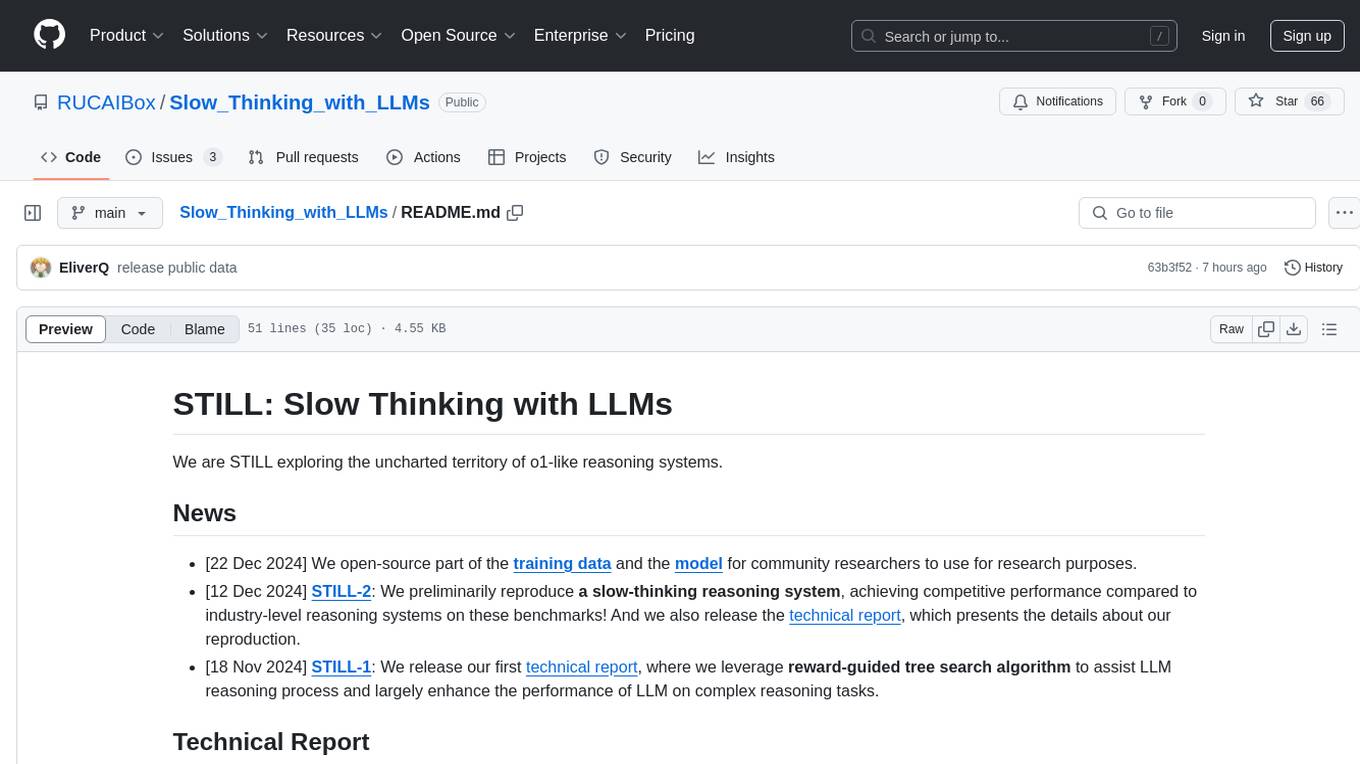
Slow_Thinking_with_LLMs
STILL is an open-source project exploring slow-thinking reasoning systems, focusing on o1-like reasoning systems. The project has released technical reports on enhancing LLM reasoning with reward-guided tree search algorithms and implementing slow-thinking reasoning systems using an imitate, explore, and self-improve framework. The project aims to replicate the capabilities of industry-level reasoning systems by fine-tuning reasoning models with long-form thought data and iteratively refining training datasets.
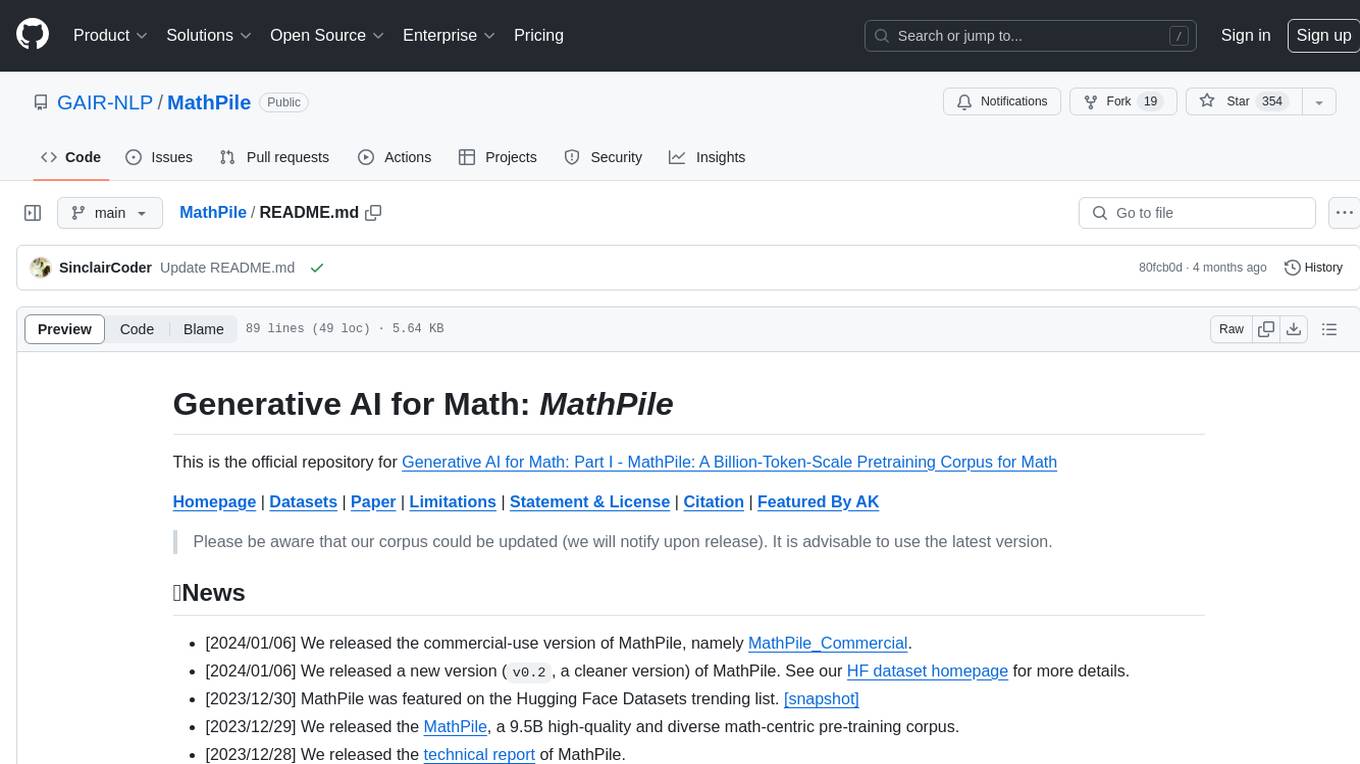
MathPile
MathPile is a generative AI tool designed for math, offering a diverse and high-quality math-centric corpus comprising about 9.5 billion tokens. It draws from various sources such as textbooks, arXiv, Wikipedia, ProofWiki, StackExchange, and web pages, catering to different educational levels and math competitions. The corpus is meticulously processed to ensure data quality, with extensive documentation and data contamination detection. MathPile aims to enhance mathematical reasoning abilities of language models.
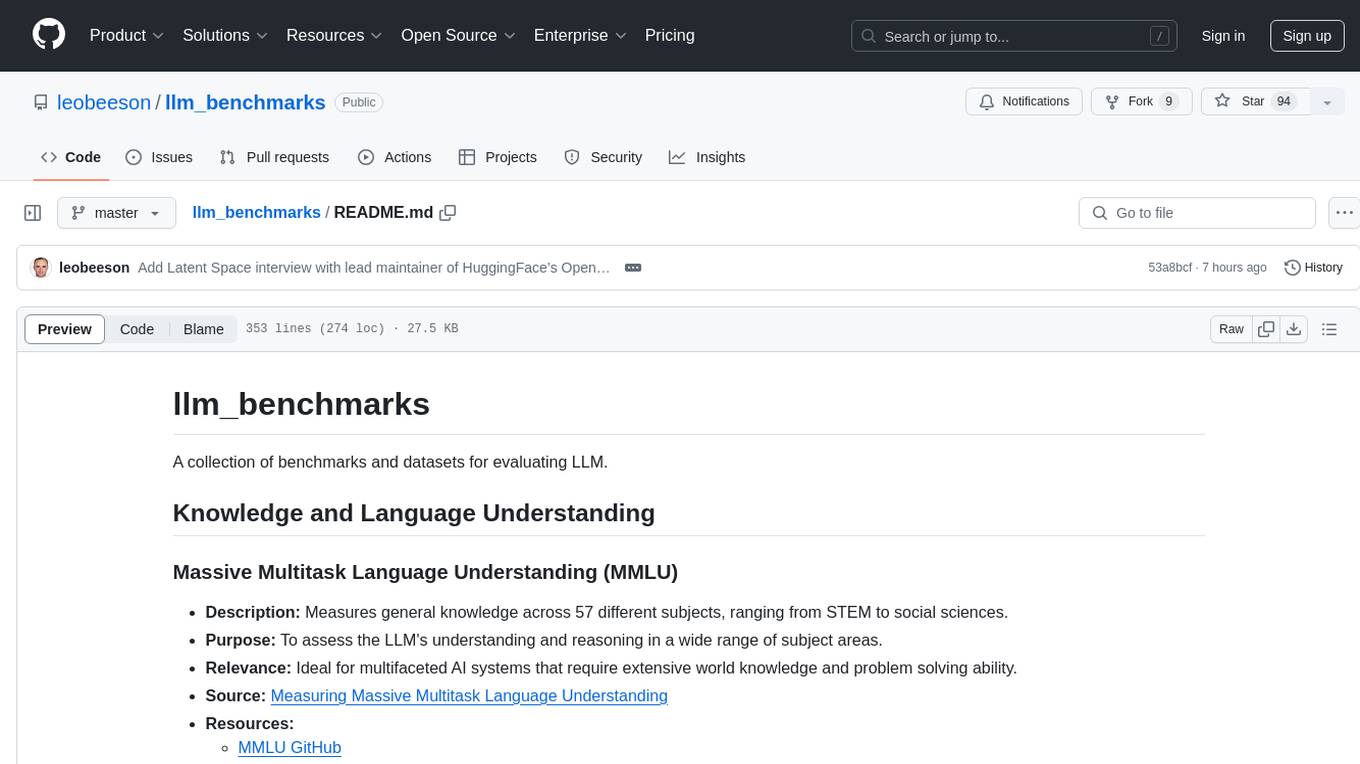
llm_benchmarks
llm_benchmarks is a collection of benchmarks and datasets for evaluating Large Language Models (LLMs). It includes various tasks and datasets to assess LLMs' knowledge, reasoning, language understanding, and conversational abilities. The repository aims to provide comprehensive evaluation resources for LLMs across different domains and applications, such as education, healthcare, content moderation, coding, and conversational AI. Researchers and developers can leverage these benchmarks to test and improve the performance of LLMs in various real-world scenarios.
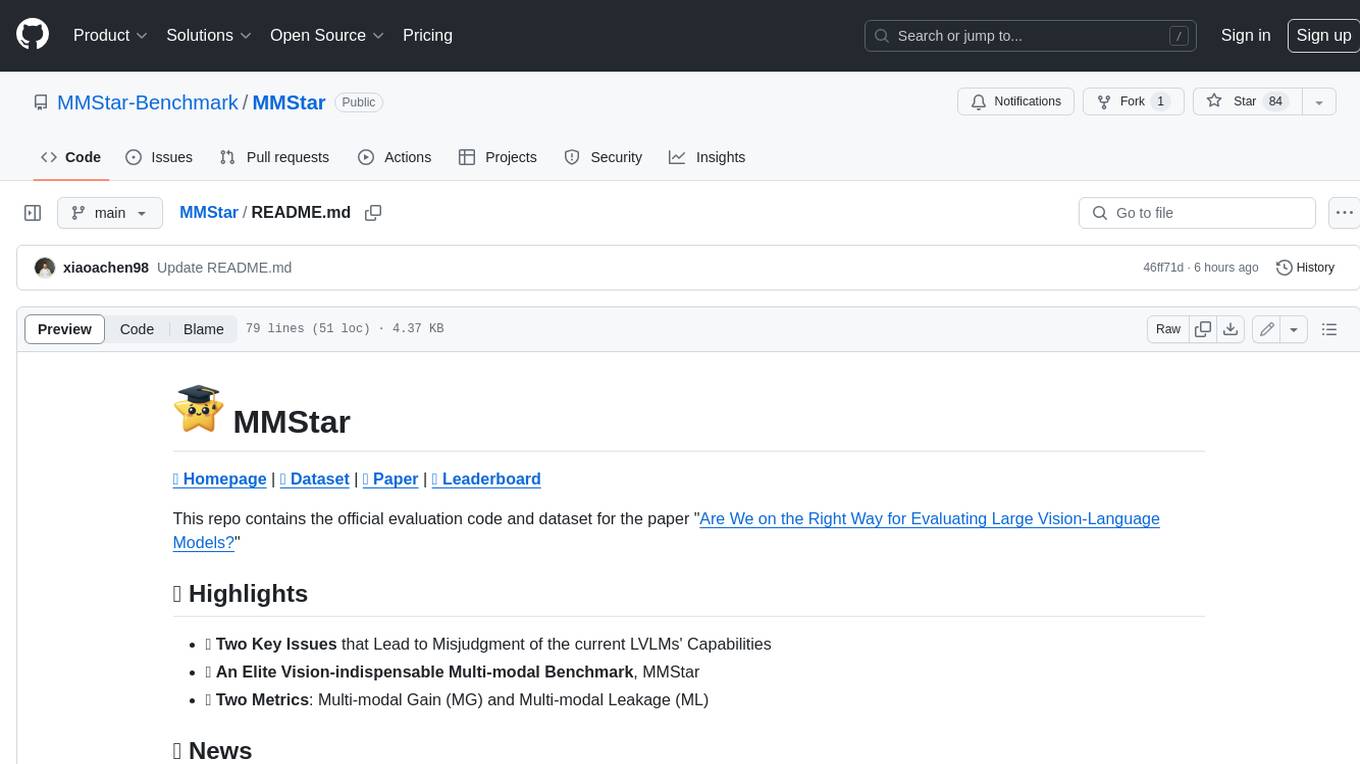
MMStar
MMStar is an elite vision-indispensable multi-modal benchmark comprising 1,500 challenge samples meticulously selected by humans. It addresses two key issues in current LLM evaluation: the unnecessary use of visual content in many samples and the existence of unintentional data leakage in LLM and LVLM training. MMStar evaluates 6 core capabilities across 18 detailed axes, ensuring a balanced distribution of samples across all dimensions.
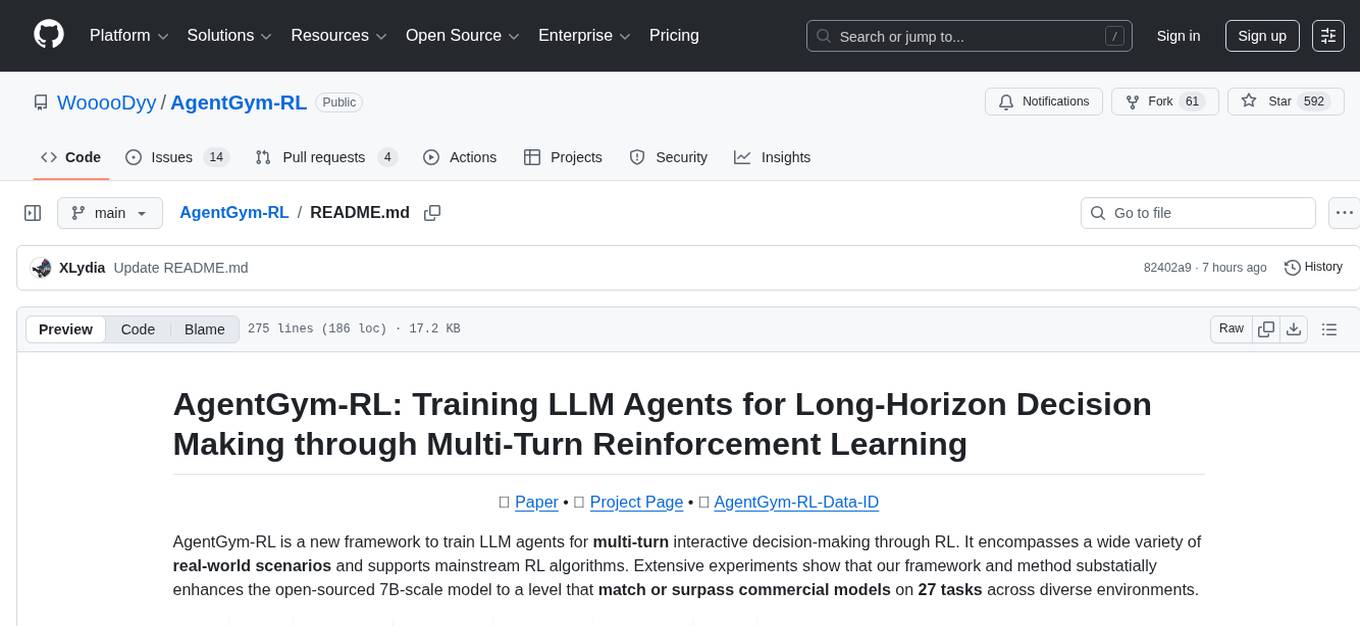
AgentGym-RL
AgentGym-RL is a framework designed to train Long-Long Memory (LLM) agents for multi-turn interactive decision-making through Reinforcement Learning. It addresses challenges in training agents for real-world scenarios by supporting mainstream RL algorithms and introducing the ScalingInter-RL method for stable optimization. The framework includes modular components for environment, agent reasoning, and training pipelines. It offers diverse environments like Web Navigation, Deep Search, Digital Games, Embodied Tasks, and Scientific Tasks. AgentGym-RL also supports various online RL algorithms and post-training strategies. The tool aims to enhance agent performance and exploration capabilities through long-horizon planning and interaction with the environment.
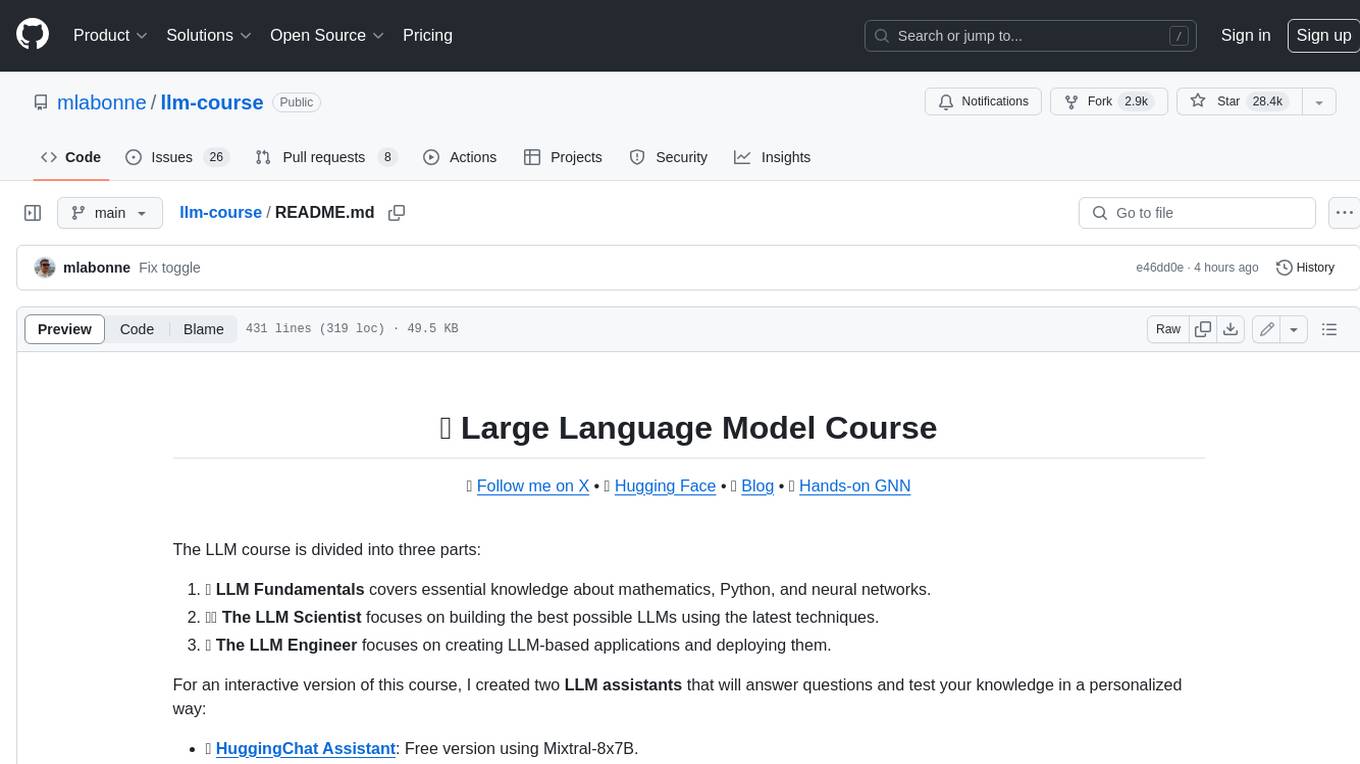
llm-course
The LLM course is divided into three parts: 1. 🧩 **LLM Fundamentals** covers essential knowledge about mathematics, Python, and neural networks. 2. 🧑🔬 **The LLM Scientist** focuses on building the best possible LLMs using the latest techniques. 3. 👷 **The LLM Engineer** focuses on creating LLM-based applications and deploying them. For an interactive version of this course, I created two **LLM assistants** that will answer questions and test your knowledge in a personalized way: * 🤗 **HuggingChat Assistant**: Free version using Mixtral-8x7B. * 🤖 **ChatGPT Assistant**: Requires a premium account. ## 📝 Notebooks A list of notebooks and articles related to large language models. ### Tools | Notebook | Description | Notebook | |----------|-------------|----------| | 🧐 LLM AutoEval | Automatically evaluate your LLMs using RunPod |  | | 🥱 LazyMergekit | Easily merge models using MergeKit in one click. |  | | 🦎 LazyAxolotl | Fine-tune models in the cloud using Axolotl in one click. |  | | ⚡ AutoQuant | Quantize LLMs in GGUF, GPTQ, EXL2, AWQ, and HQQ formats in one click. |  | | 🌳 Model Family Tree | Visualize the family tree of merged models. |  | | 🚀 ZeroSpace | Automatically create a Gradio chat interface using a free ZeroGPU. |  |
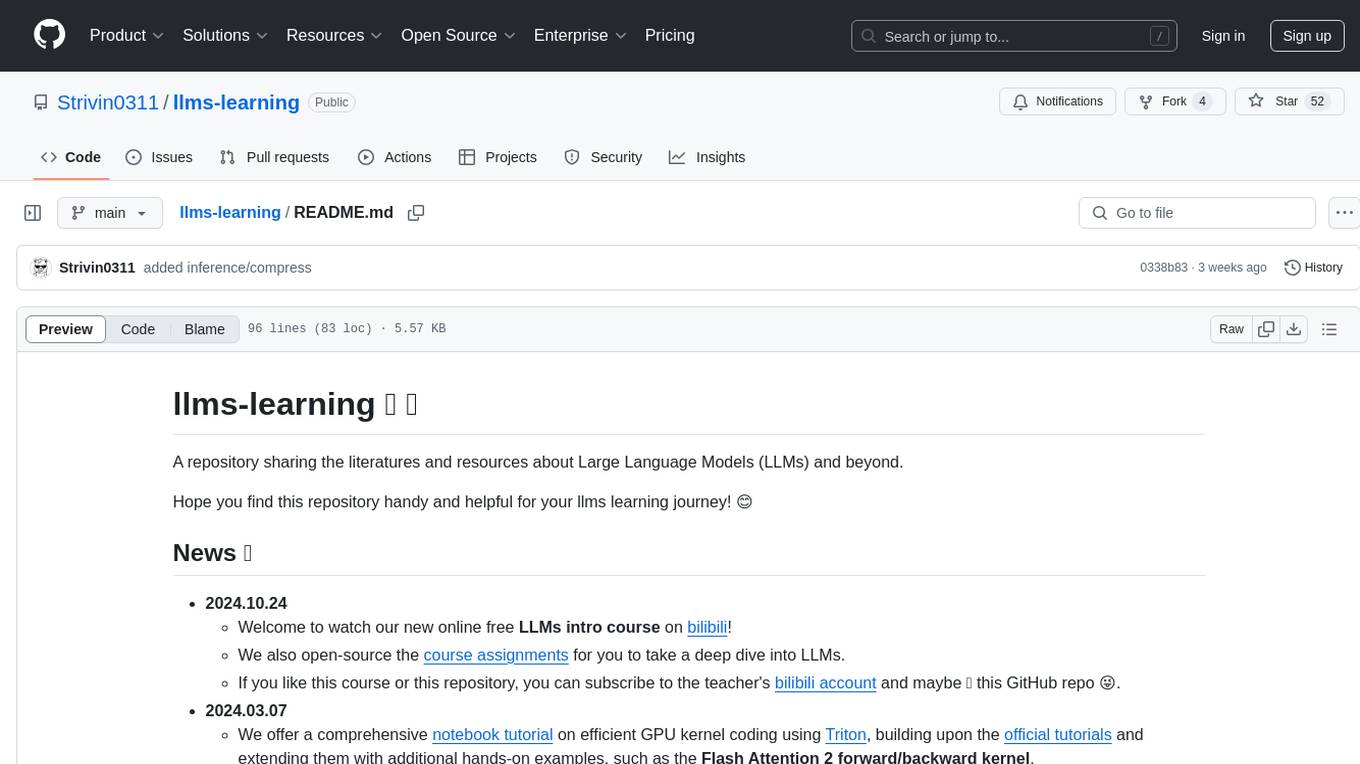
llms-learning
A repository sharing literatures and resources about Large Language Models (LLMs) and beyond. It includes tutorials, notebooks, course assignments, development stages, modeling, inference, training, applications, study, and basics related to LLMs. The repository covers various topics such as language models, transformers, state space models, multi-modal language models, training recipes, applications in autonomous driving, code, math, embodied intelligence, and more. The content is organized by different categories and provides comprehensive information on LLMs and related topics.
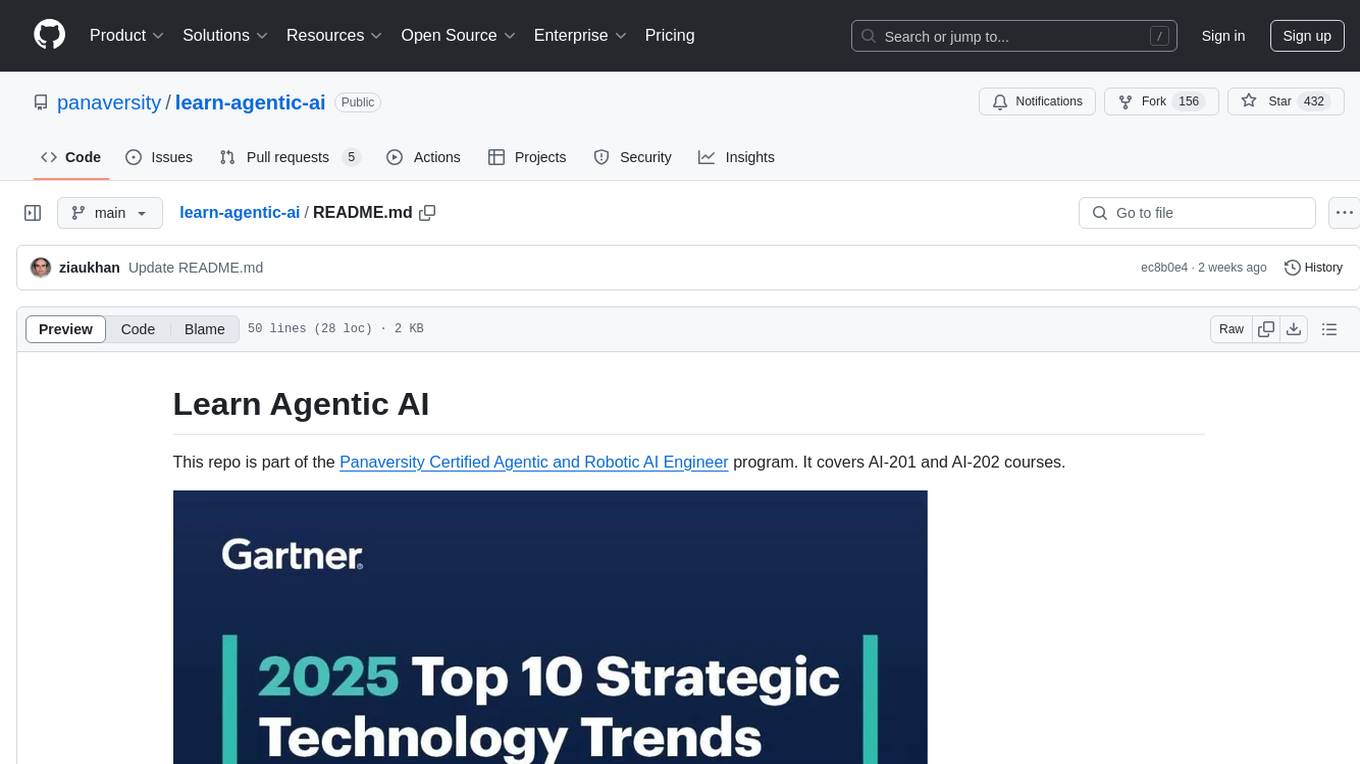
learn-agentic-ai
Learn Agentic AI is a repository that is part of the Panaversity Certified Agentic and Robotic AI Engineer program. It covers AI-201 and AI-202 courses, providing fundamentals and advanced knowledge in Agentic AI. The repository includes video playlists, projects, and project submission guidelines for students to enhance their understanding and skills in the field of AI engineering.
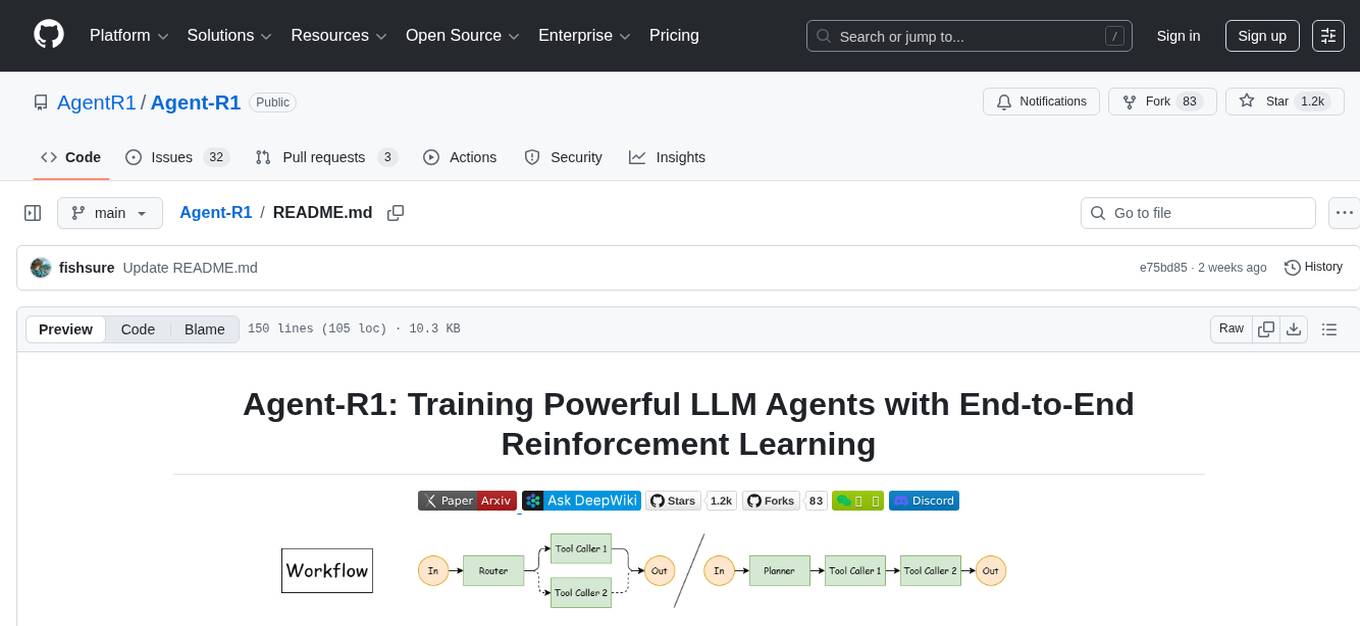
Agent-R1
Agent-R1 is an open-source framework designed to accelerate research and development at the critical intersection of RL and Agent. It employs End-to-End reinforcement learning to train agents in specific environments. Developers define domain-specific tools and reward functions to extend Agent-R1 to unique use cases, eliminating the need for complex workflow engineering. Key features include multi-turn tool calling, multi-tool coordination, process rewards, custom tools and environments, support for multiple RL algorithms, and multi-modal support. It aims to make it easier for researchers and developers to create and explore agents in their own domains, collectively advancing the development of autonomous agents.
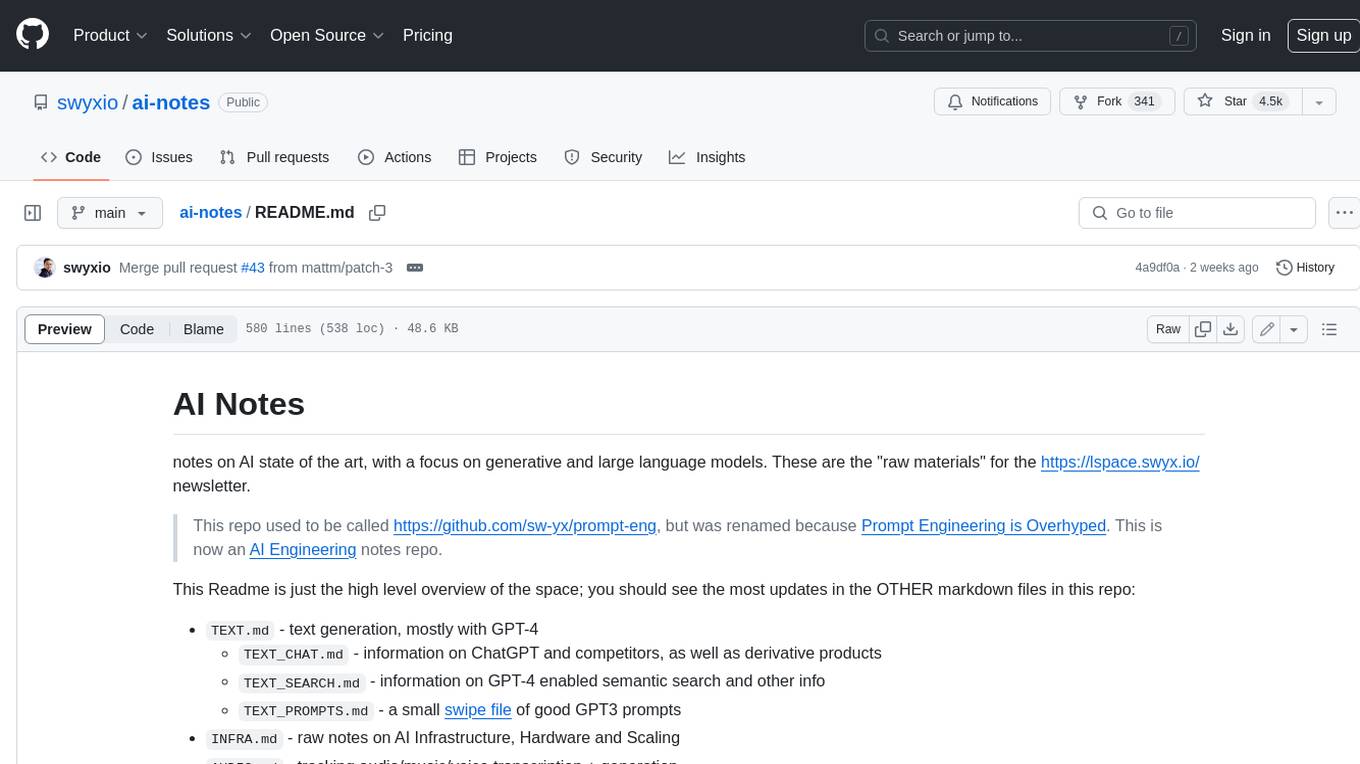
ai-notes
Notes on AI state of the art, with a focus on generative and large language models. These are the "raw materials" for the https://lspace.swyx.io/ newsletter. This repo used to be called https://github.com/sw-yx/prompt-eng, but was renamed because Prompt Engineering is Overhyped. This is now an AI Engineering notes repo.
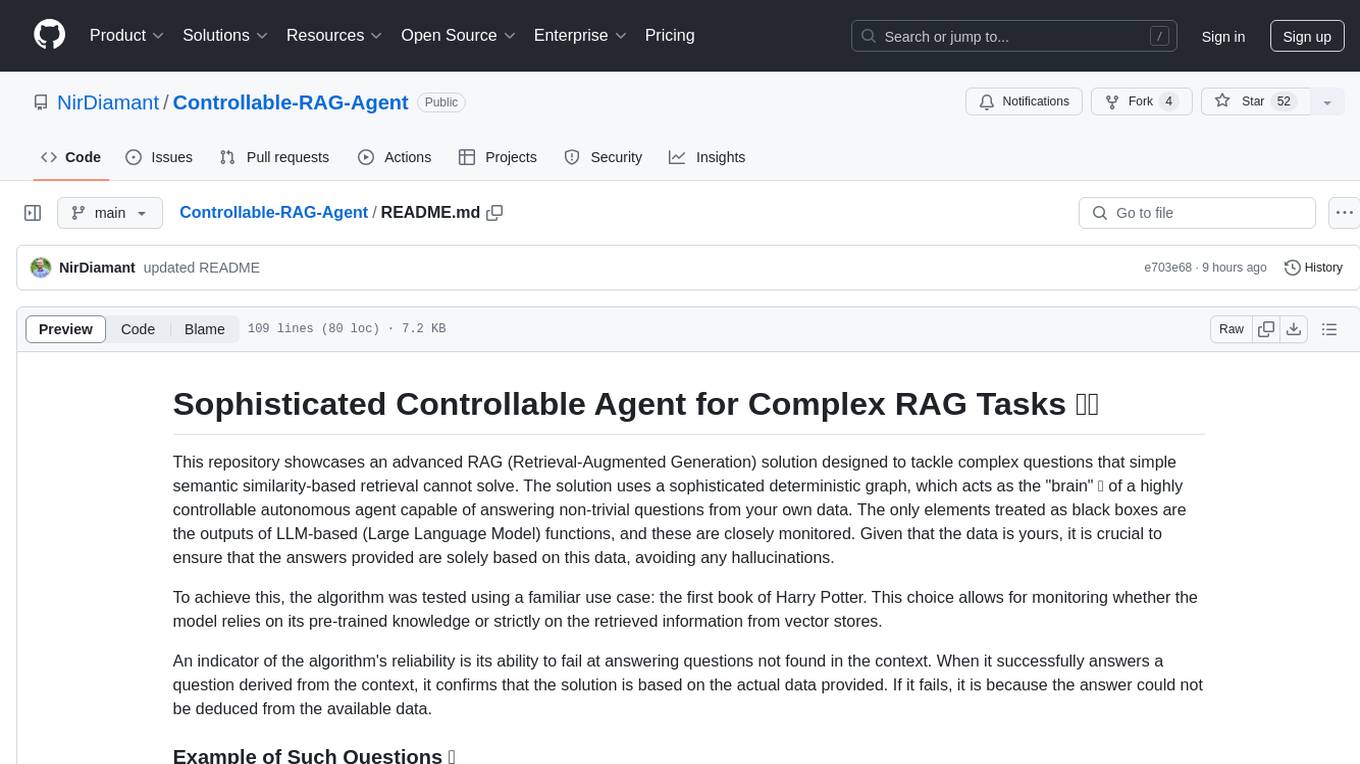
Controllable-RAG-Agent
This repository contains a sophisticated deterministic graph-based solution for answering complex questions using a controllable autonomous agent. The solution is designed to ensure that answers are solely based on the provided data, avoiding hallucinations. It involves various steps such as PDF loading, text preprocessing, summarization, database creation, encoding, and utilizing large language models. The algorithm follows a detailed workflow involving planning, retrieval, answering, replanning, content distillation, and performance evaluation. Heuristics and techniques implemented focus on content encoding, anonymizing questions, task breakdown, content distillation, chain of thought answering, verification, and model performance evaluation.
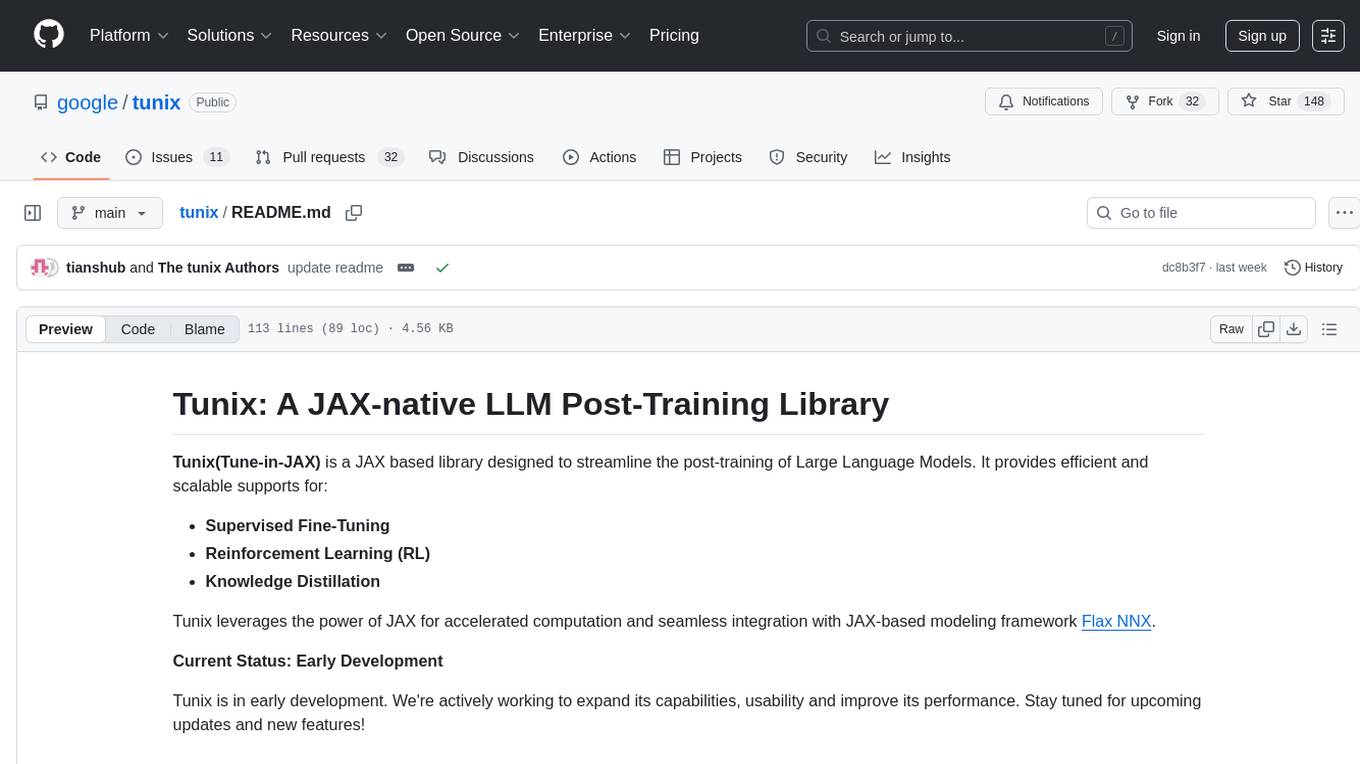
tunix
Tunix is a JAX-based library designed for post-training Large Language Models. It provides efficient support for supervised fine-tuning, reinforcement learning, and knowledge distillation. Tunix leverages JAX for accelerated computation and integrates seamlessly with the Flax NNX modeling framework. The library is modular, efficient, and designed for distributed training on accelerators like TPUs. Currently in early development, Tunix aims to expand its capabilities, usability, and performance.
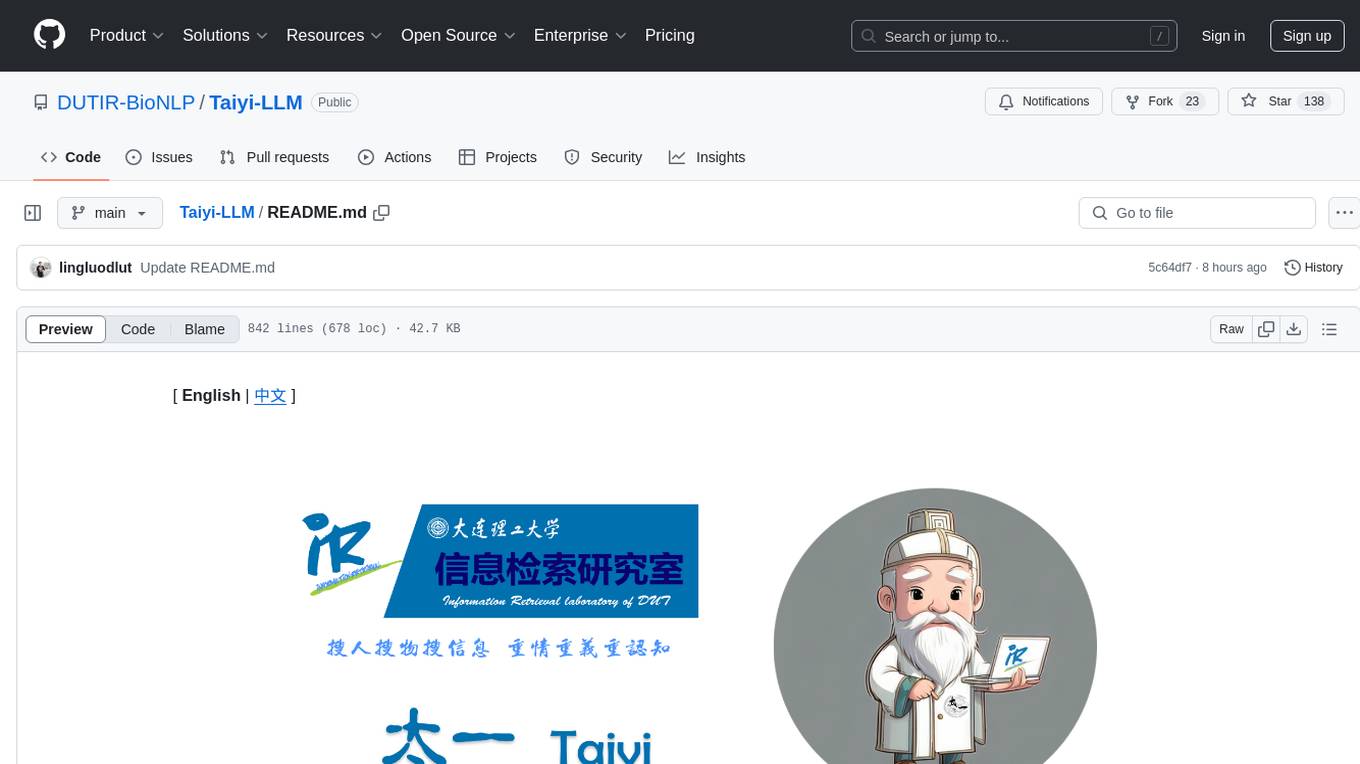
Taiyi-LLM
Taiyi (太一) is a bilingual large language model fine-tuned for diverse biomedical tasks. It aims to facilitate communication between healthcare professionals and patients, provide medical information, and assist in diagnosis, biomedical knowledge discovery, drug development, and personalized healthcare solutions. The model is based on the Qwen-7B-base model and has been fine-tuned using rich bilingual instruction data. It covers tasks such as question answering, biomedical dialogue, medical report generation, biomedical information extraction, machine translation, title generation, text classification, and text semantic similarity. The project also provides standardized data formats, model training details, model inference guidelines, and overall performance metrics across various BioNLP tasks.
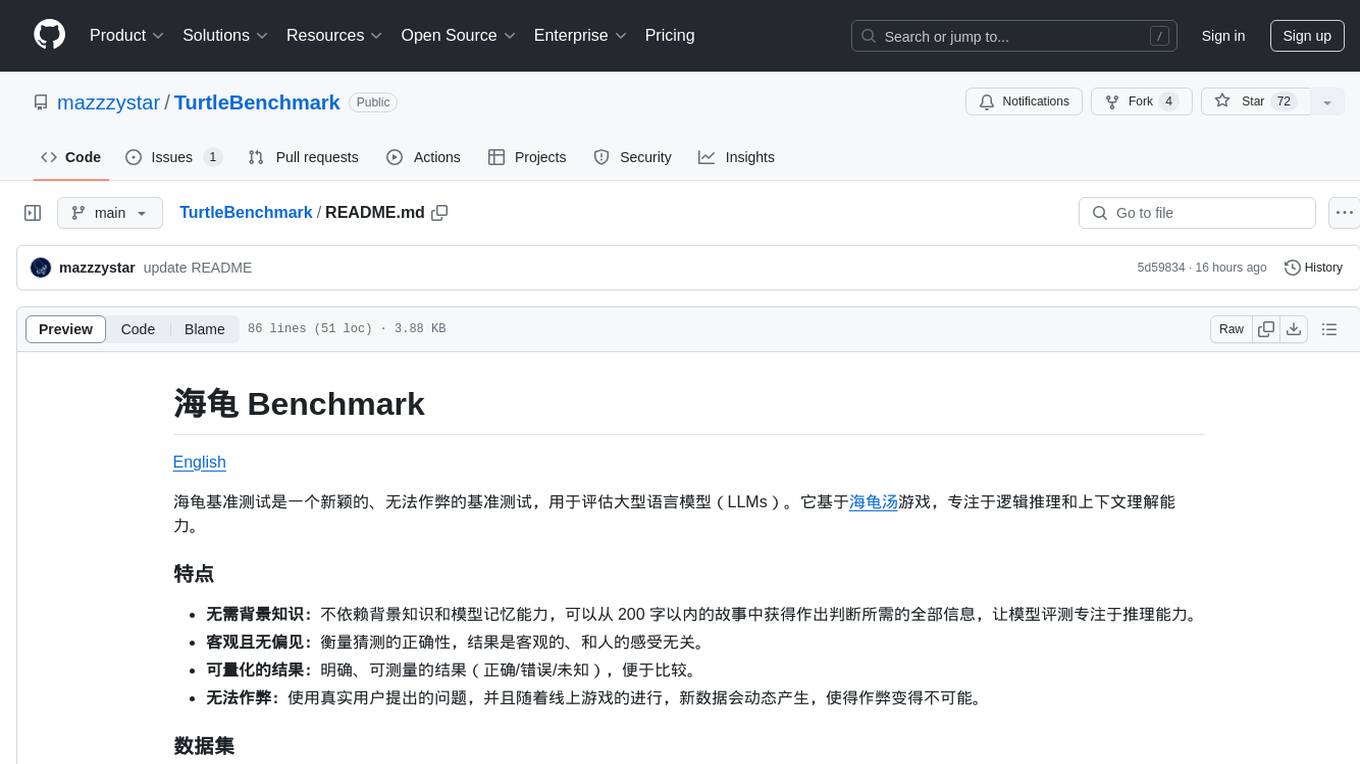
TurtleBenchmark
Turtle Benchmark is a novel and cheat-proof benchmark test used to evaluate large language models (LLMs). It is based on the Turtle Soup game, focusing on logical reasoning and context understanding abilities. The benchmark does not require background knowledge or model memory, providing all necessary information for judgment from stories under 200 words. The results are objective and unbiased, quantifiable as correct/incorrect/unknown, and impossible to cheat due to using real user-generated questions and dynamic data generation during online gameplay.
For similar tasks

MMMU
MMMU is a benchmark designed to evaluate multimodal models on college-level subject knowledge tasks, covering 30 subjects and 183 subfields with 11.5K questions. It focuses on advanced perception and reasoning with domain-specific knowledge, challenging models to perform tasks akin to those faced by experts. The evaluation of various models highlights substantial challenges, with room for improvement to stimulate the community towards expert artificial general intelligence (AGI).

labelbox-python
Labelbox is a data-centric AI platform for enterprises to develop, optimize, and use AI to solve problems and power new products and services. Enterprises use Labelbox to curate data, generate high-quality human feedback data for computer vision and LLMs, evaluate model performance, and automate tasks by combining AI and human-centric workflows. The academic & research community uses Labelbox for cutting-edge AI research.
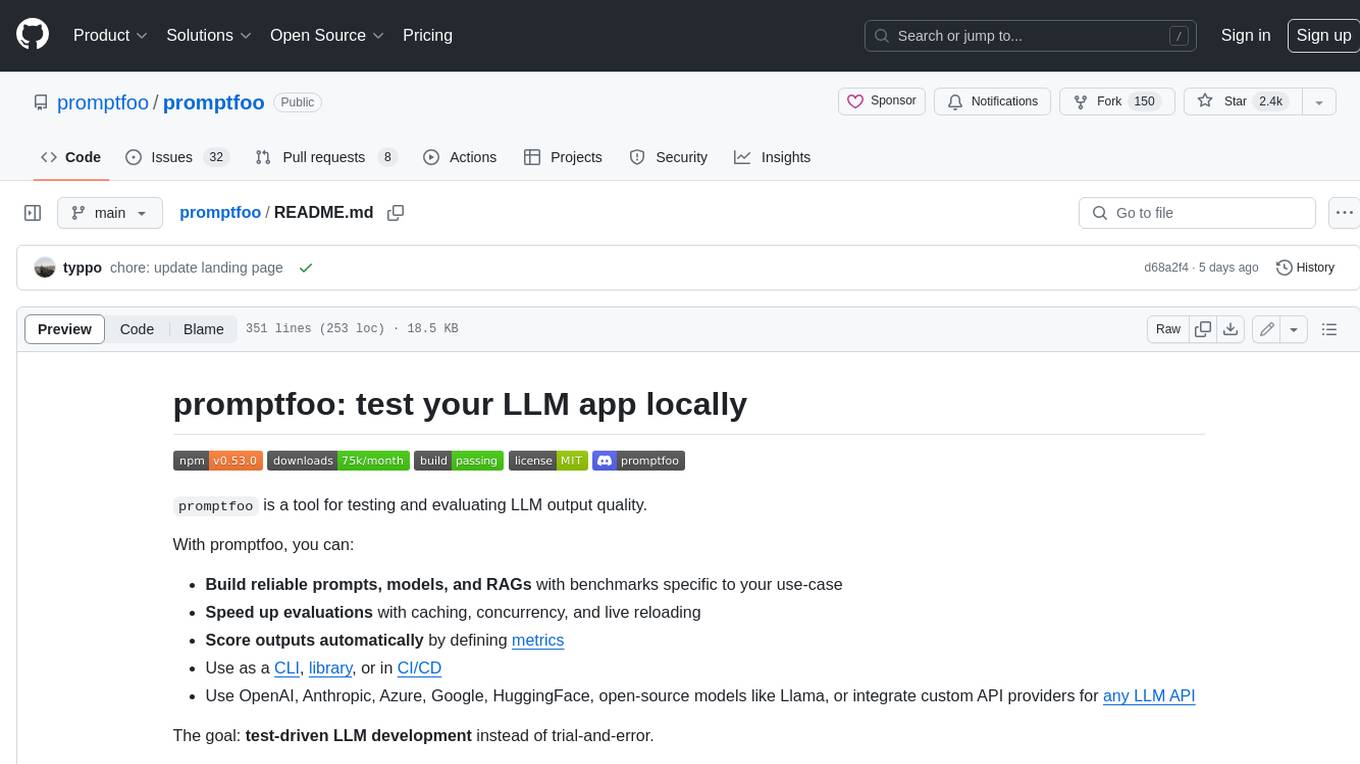
promptfoo
Promptfoo is a tool for testing and evaluating LLM output quality. With promptfoo, you can build reliable prompts, models, and RAGs with benchmarks specific to your use-case, speed up evaluations with caching, concurrency, and live reloading, score outputs automatically by defining metrics, use as a CLI, library, or in CI/CD, and use OpenAI, Anthropic, Azure, Google, HuggingFace, open-source models like Llama, or integrate custom API providers for any LLM API.
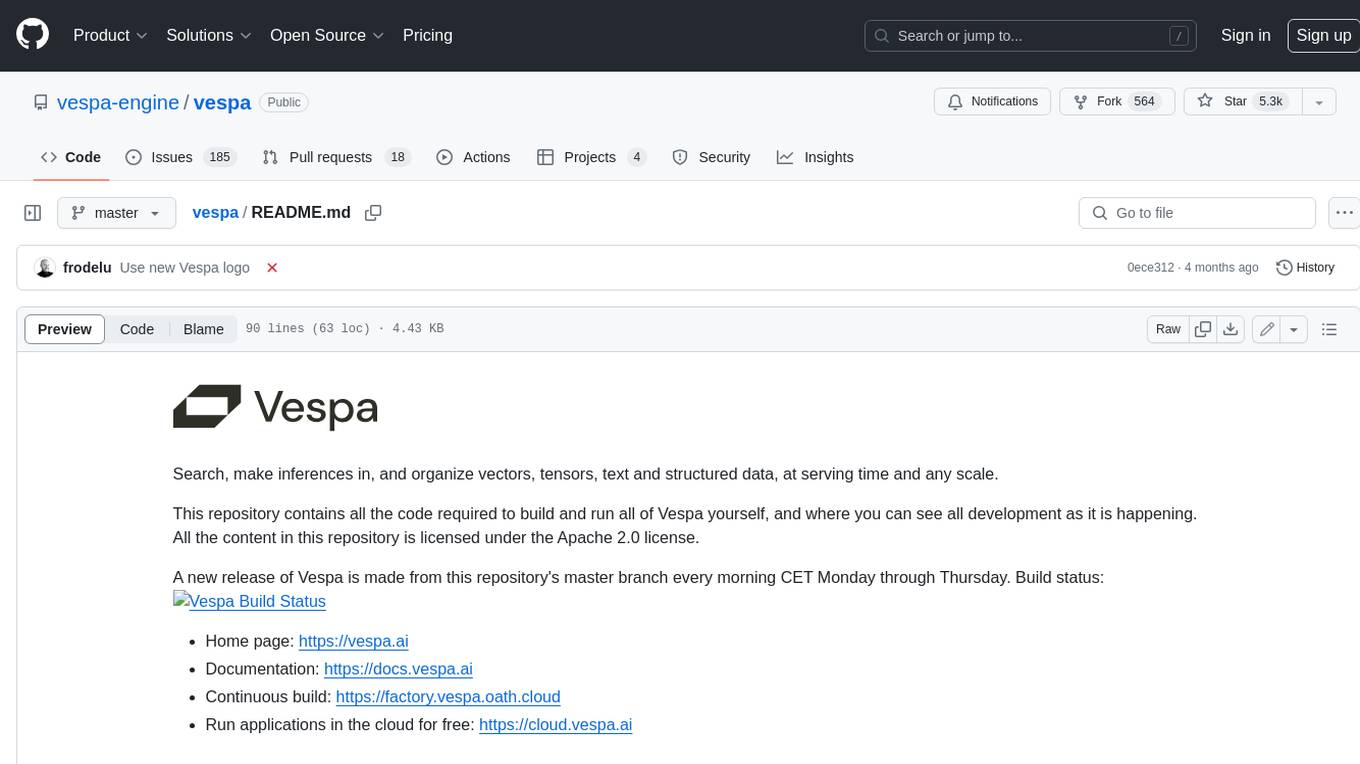
vespa
Vespa is a platform that performs operations such as selecting a subset of data in a large corpus, evaluating machine-learned models over the selected data, organizing and aggregating it, and returning it, typically in less than 100 milliseconds, all while the data corpus is continuously changing. It has been in development for many years and is used on a number of large internet services and apps which serve hundreds of thousands of queries from Vespa per second.
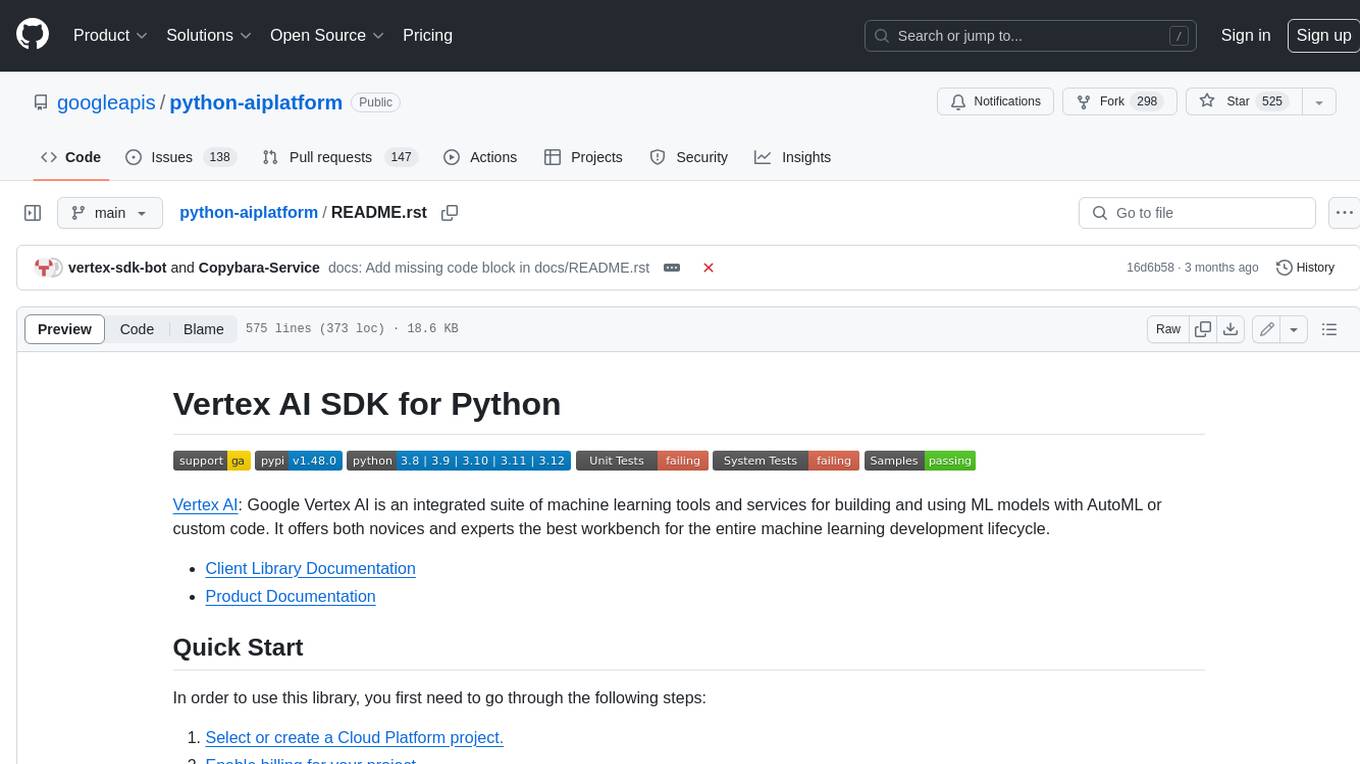
python-aiplatform
The Vertex AI SDK for Python is a library that provides a convenient way to use the Vertex AI API. It offers a high-level interface for creating and managing Vertex AI resources, such as datasets, models, and endpoints. The SDK also provides support for training and deploying custom models, as well as using AutoML models. With the Vertex AI SDK for Python, you can quickly and easily build and deploy machine learning models on Vertex AI.

ScandEval
ScandEval is a framework for evaluating pretrained language models on mono- or multilingual language tasks. It provides a unified interface for benchmarking models on a variety of tasks, including sentiment analysis, question answering, and machine translation. ScandEval is designed to be easy to use and extensible, making it a valuable tool for researchers and practitioners alike.

opencompass
OpenCompass is a one-stop platform for large model evaluation, aiming to provide a fair, open, and reproducible benchmark for large model evaluation. Its main features include: * Comprehensive support for models and datasets: Pre-support for 20+ HuggingFace and API models, a model evaluation scheme of 70+ datasets with about 400,000 questions, comprehensively evaluating the capabilities of the models in five dimensions. * Efficient distributed evaluation: One line command to implement task division and distributed evaluation, completing the full evaluation of billion-scale models in just a few hours. * Diversified evaluation paradigms: Support for zero-shot, few-shot, and chain-of-thought evaluations, combined with standard or dialogue-type prompt templates, to easily stimulate the maximum performance of various models. * Modular design with high extensibility: Want to add new models or datasets, customize an advanced task division strategy, or even support a new cluster management system? Everything about OpenCompass can be easily expanded! * Experiment management and reporting mechanism: Use config files to fully record each experiment, and support real-time reporting of results.
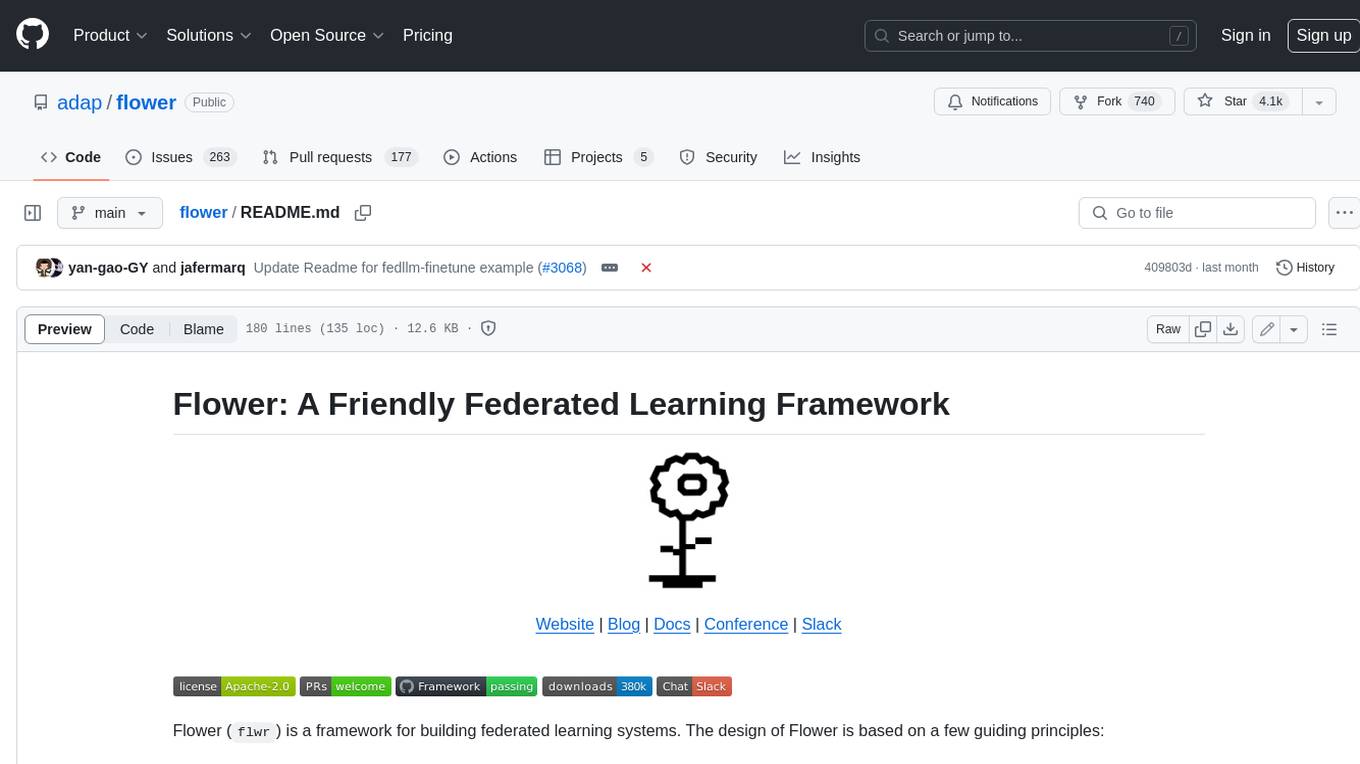
flower
Flower is a framework for building federated learning systems. It is designed to be customizable, extensible, framework-agnostic, and understandable. Flower can be used with any machine learning framework, for example, PyTorch, TensorFlow, Hugging Face Transformers, PyTorch Lightning, scikit-learn, JAX, TFLite, MONAI, fastai, MLX, XGBoost, Pandas for federated analytics, or even raw NumPy for users who enjoy computing gradients by hand.
For similar jobs

Perplexica
Perplexica is an open-source AI-powered search engine that utilizes advanced machine learning algorithms to provide clear answers with sources cited. It offers various modes like Copilot Mode, Normal Mode, and Focus Modes for specific types of questions. Perplexica ensures up-to-date information by using SearxNG metasearch engine. It also features image and video search capabilities and upcoming features include finalizing Copilot Mode and adding Discover and History Saving features.

KULLM
KULLM (구름) is a Korean Large Language Model developed by Korea University NLP & AI Lab and HIAI Research Institute. It is based on the upstage/SOLAR-10.7B-v1.0 model and has been fine-tuned for instruction. The model has been trained on 8×A100 GPUs and is capable of generating responses in Korean language. KULLM exhibits hallucination and repetition phenomena due to its decoding strategy. Users should be cautious as the model may produce inaccurate or harmful results. Performance may vary in benchmarks without a fixed system prompt.

MMMU
MMMU is a benchmark designed to evaluate multimodal models on college-level subject knowledge tasks, covering 30 subjects and 183 subfields with 11.5K questions. It focuses on advanced perception and reasoning with domain-specific knowledge, challenging models to perform tasks akin to those faced by experts. The evaluation of various models highlights substantial challenges, with room for improvement to stimulate the community towards expert artificial general intelligence (AGI).

1filellm
1filellm is a command-line data aggregation tool designed for LLM ingestion. It aggregates and preprocesses data from various sources into a single text file, facilitating the creation of information-dense prompts for large language models. The tool supports automatic source type detection, handling of multiple file formats, web crawling functionality, integration with Sci-Hub for research paper downloads, text preprocessing, and token count reporting. Users can input local files, directories, GitHub repositories, pull requests, issues, ArXiv papers, YouTube transcripts, web pages, Sci-Hub papers via DOI or PMID. The tool provides uncompressed and compressed text outputs, with the uncompressed text automatically copied to the clipboard for easy pasting into LLMs.
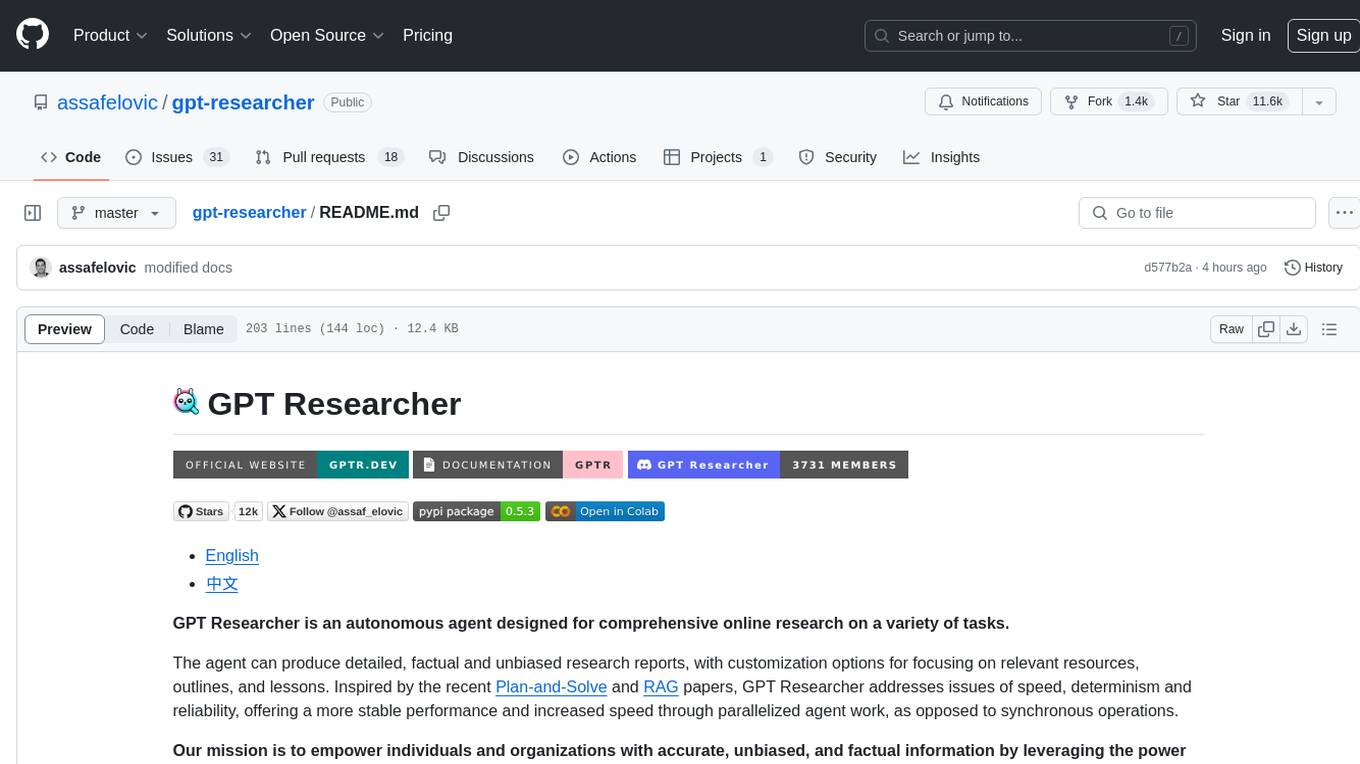
gpt-researcher
GPT Researcher is an autonomous agent designed for comprehensive online research on a variety of tasks. It can produce detailed, factual, and unbiased research reports with customization options. The tool addresses issues of speed, determinism, and reliability by leveraging parallelized agent work. The main idea involves running 'planner' and 'execution' agents to generate research questions, seek related information, and create research reports. GPT Researcher optimizes costs and completes tasks in around 3 minutes. Features include generating long research reports, aggregating web sources, an easy-to-use web interface, scraping web sources, and exporting reports to various formats.
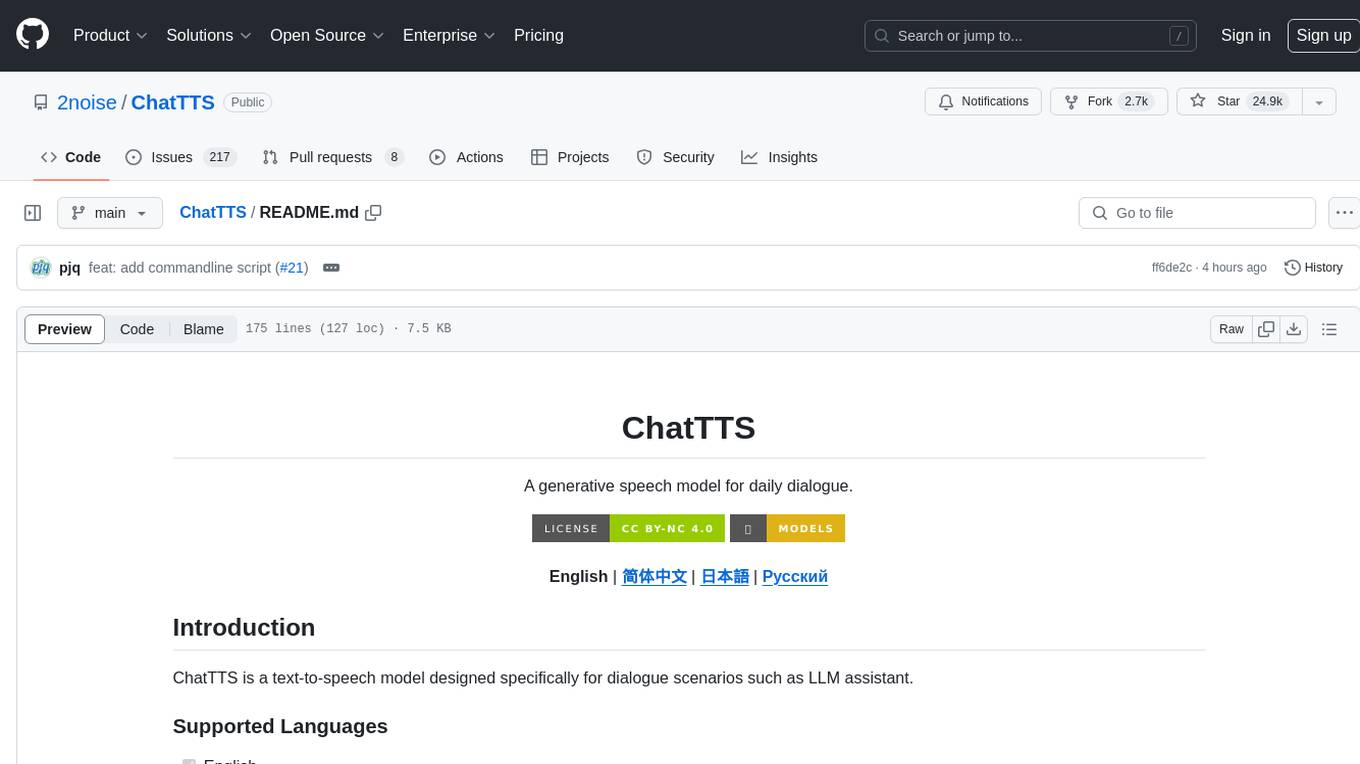
ChatTTS
ChatTTS is a generative speech model optimized for dialogue scenarios, providing natural and expressive speech synthesis with fine-grained control over prosodic features. It supports multiple speakers and surpasses most open-source TTS models in terms of prosody. The model is trained with 100,000+ hours of Chinese and English audio data, and the open-source version on HuggingFace is a 40,000-hour pre-trained model without SFT. The roadmap includes open-sourcing additional features like VQ encoder, multi-emotion control, and streaming audio generation. The tool is intended for academic and research use only, with precautions taken to limit potential misuse.
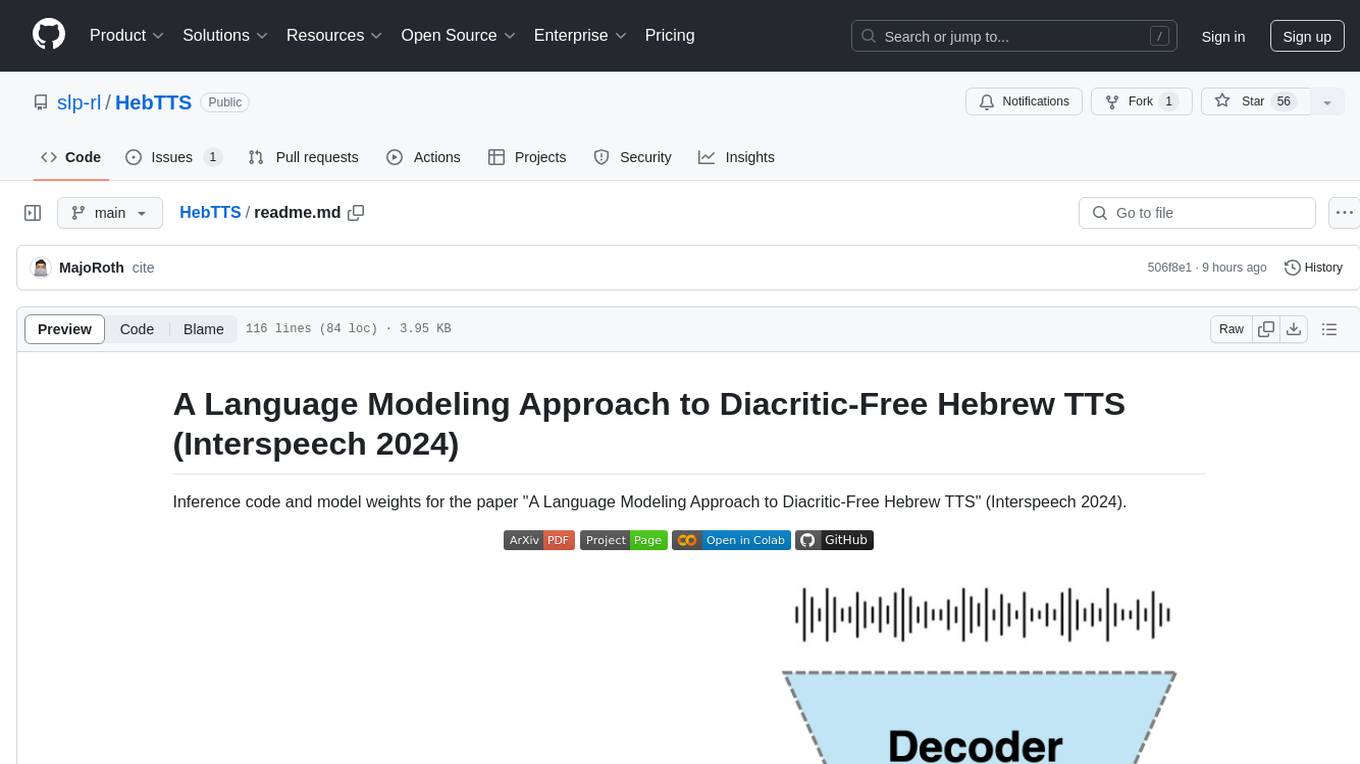
HebTTS
HebTTS is a language modeling approach to diacritic-free Hebrew text-to-speech (TTS) system. It addresses the challenge of accurately mapping text to speech in Hebrew by proposing a language model that operates on discrete speech representations and is conditioned on a word-piece tokenizer. The system is optimized using weakly supervised recordings and outperforms diacritic-based Hebrew TTS systems in terms of content preservation and naturalness of generated speech.
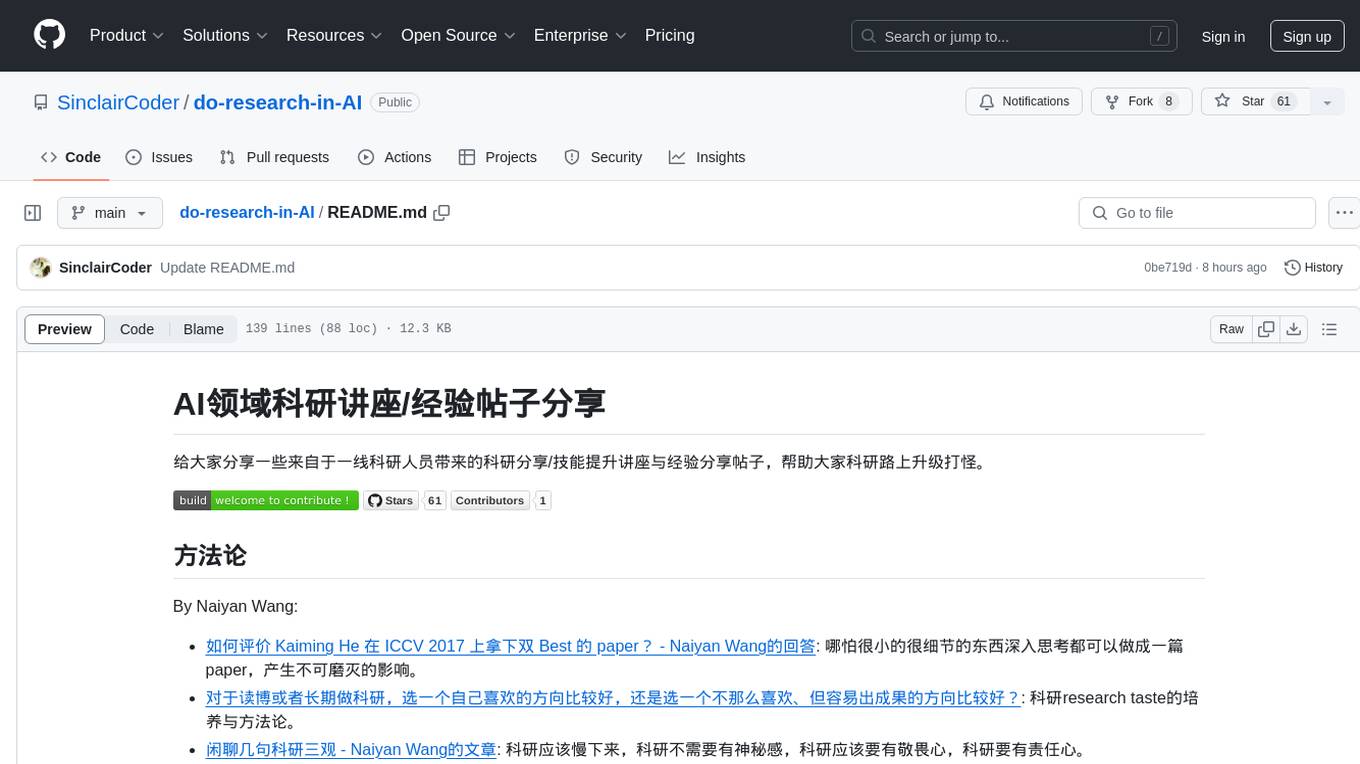
do-research-in-AI
This repository is a collection of research lectures and experience sharing posts from frontline researchers in the field of AI. It aims to help individuals upgrade their research skills and knowledge through insightful talks and experiences shared by experts. The content covers various topics such as evaluating research papers, choosing research directions, research methodologies, and tips for writing high-quality scientific papers. The repository also includes discussions on academic career paths, research ethics, and the emotional aspects of research work. Overall, it serves as a valuable resource for individuals interested in advancing their research capabilities in the field of AI.


